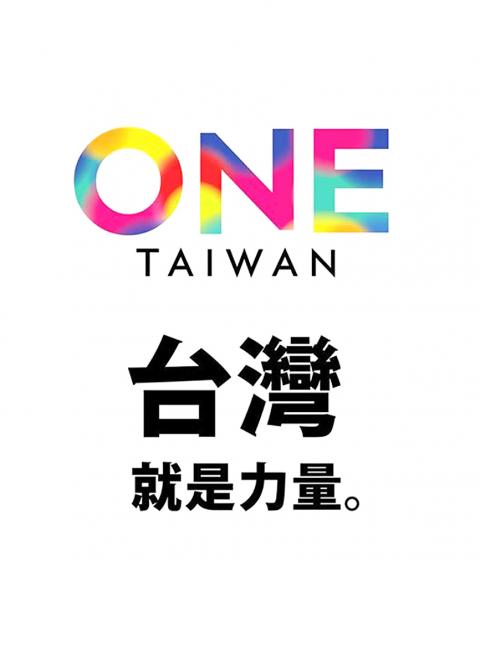Chinese Nationalist Party (KMT) presidential candidate Eric Chu’s (朱立倫) latest campaign slogan unveiled yesterday has triggered a heated online discussion on its underlying messages, as well as bringing accusations of plagiarism.
Early yesterday, Chu posted on Facebook a photograph showing a billboard in Taipei’s downtown area with the slogan “One Taiwan.”
“Past campaigns were usually a process of prolonged bickering ... but after staring at a few key words — solidarity, action and strength — which I selected from a long list, I have come to a realization about the predicaments Taiwan has experienced over the years,” Chu wrote on Facebook.

Photo: Screen grab from Facebook
Chu said he realized that people generally tend to spend more time arguing over problems than trying to tackle them, which has led to the nation’s stagnant economy and “social chaos.”
Addressing Taiwan’s problems requires unity, mutual tolerance and comprehension, Chu said.
“We must jointly march forward into the future with a multicolored, diversified, and united ‘one Taiwan,’” he said.
Some netizens were quick to fill in the blank for Chu’s campaign slogan, saying his “One Taiwan” insinuates Taiwanese independence and stands for “one Taiwan, one China.”
“It is brave of Chu to imply there is ‘one Taiwan, one China’ in his campaign slogan, but why not just say the whole thing?” Taipei City Government policy adviser Hung Chih-kun (洪智坤) said.
Others accused Chu of using the name of Taiwan to solicit votes.
“Chu is saying ‘one Taiwan’ but thinking about ‘one China,’” said a Facebook user who identified himself as Wang Chih Kang. “The 2.0 version [of President Ma Ying-jeou (馬英九)] must be thinking how gullible Taiwanese are.”
Another netizen, named Cheng Sheng-chuan (鄭勝全), compared the KMT to a schizophrenic person who thinks about “one China” on ordinary days, but automatically shifts their stance to “One Taiwan” during campaign season.
Several netizens accused Chu of plagiarism, saying there is a striking resemblance between the design for his “One Taiwan” poster and that for Democratic Progressive Party (DPP) presidential candidate Tsai Ing-wen’s (蔡英文) campaign advert “Light Up Taiwan.”
Both Tsai’s and Chu’s campaign advertisements are against a white backdrop and use a similar calligraphic style for the word “Taiwan.”
The DPP advert features a hollow circle in various shades of green, while the letter “O” in Chu’s billboard is rainbow-colored.
“Does it mean Chu agrees with Tsai’s principles and values? He should at least put the name and emblem of his party on the billboard, otherwise people might mistake it for one of Tsai’s campaign ads,” a Facebook user named Liu Che-wei (劉哲瑋) wrote.
Chu said that his “One Taiwan” idea means bringing everyone together regardless of where they are from, their social status or wealth.
“That is the primary mission of a head of state,” he said.

An essay competition jointly organized by a local writing society and a publisher affiliated with the Chinese Communist Party (CCP) might have contravened the Act Governing Relations Between the People of the Taiwan Area and the Mainland Area (臺灣地區與大陸地區人民關係條例), the Mainland Affairs Council (MAC) said on Thursday. “In this case, the partner organization is clearly an agency under the CCP’s Fujian Provincial Committee,” MAC Deputy Minister and spokesperson Liang Wen-chieh (梁文傑) said at a news briefing in Taipei. “It also involves bringing Taiwanese students to China with all-expenses-paid arrangements to attend award ceremonies and camps,” Liang said. Those two “characteristics” are typically sufficient

A magnitude 5.9 earthquake that struck about 33km off the coast of Hualien City was the "main shock" in a series of quakes in the area, with aftershocks expected over the next three days, the Central Weather Administration (CWA) said yesterday. Prior to the magnitude 5.9 quake shaking most of Taiwan at 6:53pm yesterday, six other earthquakes stronger than a magnitude of 4, starting with a magnitude 5.5 quake at 6:09pm, occurred in the area. CWA Seismological Center Director Wu Chien-fu (吳健富) confirmed that the quakes were all part of the same series and that the magnitude 5.5 temblor was

The brilliant blue waters, thick foliage and bucolic atmosphere on this seemingly idyllic archipelago deep in the Pacific Ocean belie the key role it now plays in a titanic geopolitical struggle. Palau is again on the front line as China, and the US and its allies prepare their forces in an intensifying contest for control over the Asia-Pacific region. The democratic nation of just 17,000 people hosts US-controlled airstrips and soon-to-be-completed radar installations that the US military describes as “critical” to monitoring vast swathes of water and airspace. It is also a key piece of the second island chain, a string of

The Central Weather Administration has issued a heat alert for southeastern Taiwan, warning of temperatures as high as 36°C today, while alerting some coastal areas of strong winds later in the day. Kaohsiung’s Neimen District (內門) and Pingtung County’s Neipu Township (內埔) are under an orange heat alert, which warns of temperatures as high as 36°C for three consecutive days, the CWA said, citing southwest winds. The heat would also extend to Tainan’s Nansi (楠西) and Yujing (玉井) districts, as well as Pingtung’s Gaoshu (高樹), Yanpu (鹽埔) and Majia (瑪家) townships, it said, forecasting highs of up to 36°C in those areas